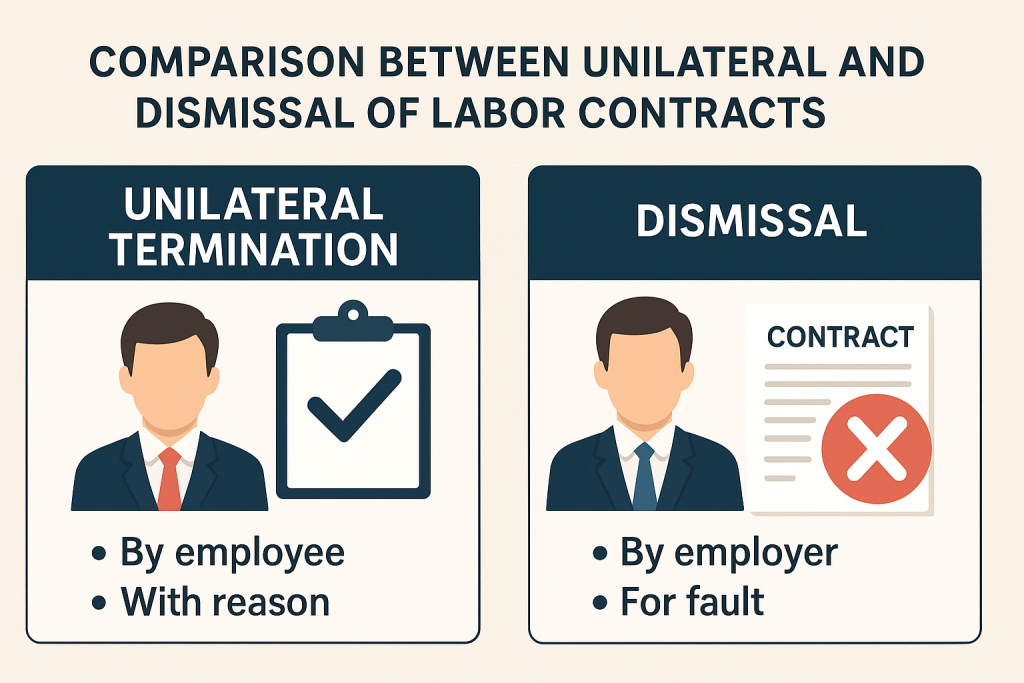
The termination of a labor contract marks a critical turning point in the employment relationship, often accompanied by significant legal, financial, and emotional implications. Among the various types of contract termination, unilateral termination and dismissal are two distinct forms, each governed by specific legal frameworks and procedures. While both involve the employer’s decision to end the labor relationship, they differ fundamentally in their causes, legal basis, procedural requirements, and consequences. These differences are not merely academic but have practical implications for employers aiming to comply with labor laws and for employees seeking to protect their rights. Misunderstanding these terms can lead to disputes, legal violations, and financial liabilities. Therefore, it is crucial to understand these two forms of termination comprehensively, not only to ensure lawful practices but also to maintain a fair and transparent employment environment.
- Definition
- Unilateral Termination of Labor Contracts
Unilateral termination of a labor contract refers to the act of one party in the employment relationship (either the employer or the employee) terminating the labor contract without the consent of the other party. This form of termination is legally permissible only when it complies with the provisions of labor laws, ensuring that neither party’s rights are infringed.
- Dismissal
Dismissal is a disciplinary measure through which the employer terminates the labor contract due to the employee’s misconduct. As outlined in Article 125 of the 2019 Labor Code (Vietnam), dismissal represents the most severe form of labor discipline. It results in the immediate termination of the employment relationship and is initiated solely by the employer.
Employers are entitled to impose dismissal in cases involving serious violations such as theft, embezzlement, disclosure of business secrets, or repeated disciplinary offenses. Other grounds include unauthorized absences exceeding permissible limits or actions that cause significant harm to the employer’s business. These cases must align with strict procedural requirements to ensure compliance with labor laws.
- Comparison Between Unilateral Termination and Dismissal
| Criteria | Dismissal | Unilateral Termination of Labor Contracts |
| Definition | Dismissal is a disciplinary measure imposed by the employer to terminate the labor contract due to serious violations of labor regulations by the employee. | Unilateral termination is the act of one party (employer or employee) ending the labor contract without requiring the consent of the other party, provided it complies with legal requirements. |
| Legal Basis | Article 125 of the 2019 Labor Code specifies acts such as theft, embezzlement, gambling, intentional injury, use of narcotics in the workplace, disclosure of business secrets, or repeated violations of disciplinary measures as grounds for dismissal. | Article 36 of the 2019 Labor Code allows unilateral termination by the employer for specific reasons, such as the employee’s failure to meet job requirements, prolonged illness, natural disasters, or the employee’s absence without justification for five consecutive working days or more. |
| Procedures | Dismissal requires a formal disciplinary process, including a meeting with representatives from the trade union (if applicable) and the employee, with prior written notice sent five days in advance. The meeting must be documented, and the decision must be signed and delivered to the employee in writing. | The employer must comply with the mandatory notice period: 45 days for indefinite-term contracts, 30 days for fixed-term contracts, and 3 working days for seasonal or job-specific contracts. No disciplinary meeting is required, making the procedure simpler. |
| Statute of Limitations | Employers must impose dismissal within six months of the violation or within 12 months for financial or property-related misconduct. | No statute of limitations applies. The employer’s right to unilaterally terminate the contract remains valid as long as the grounds for termination exist and the notice period is respected. |
| Legal Consequences | Employees dismissed for misconduct are not entitled to severance pay. | Employees whose contracts are unilaterally terminated are entitled to severance pay if they meet the conditions, such as having worked for the employer for 12 months or more. |
In the context of labor relationships, understanding the differences between unilateral termination and dismissal is essential for both employers and employees to ensure lawful and fair practices. Dismissal is a disciplinary measure reserved for serious misconduct by the employee, requiring strict adherence to legal procedures and offering no severance pay. On the other hand, unilateral termination is a broader right available to both parties, allowing the contract to end under specific conditions with simpler procedural requirements, though severance pay may apply. These distinctions are not only important for avoiding legal disputes but also for maintaining a transparent and equitable workplace. By comprehensively understanding these two concepts, employers can minimize risks of non-compliance, and employees can better assert their rights, ultimately fostering a harmonious and legally compliant employment relationship.
📞 CONTACT LEGAL CONSULTANT:
TLA Law is a leading law firm with a team of highly experienced lawyers specializing in criminal, civil, corporate, marriage and family law, and more. We are committed to providing comprehensive legal support and answering all your legal questions. If you have any further questions, please do not hesitate to contact us.
1. Lawyer Vu Thi Phuong Thanh, Manager of TLA Law LLC, Ha Noi Bar Association
Email: vtpthanh@tlalaw.vn
2. Lawyer Tran My Le, Chairman of the Members’ Council, Ha Noi Bar Association
Email: tmle@tlalaw.vn.
Dinh Phuong Thao

